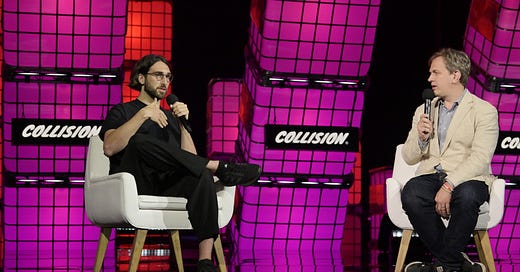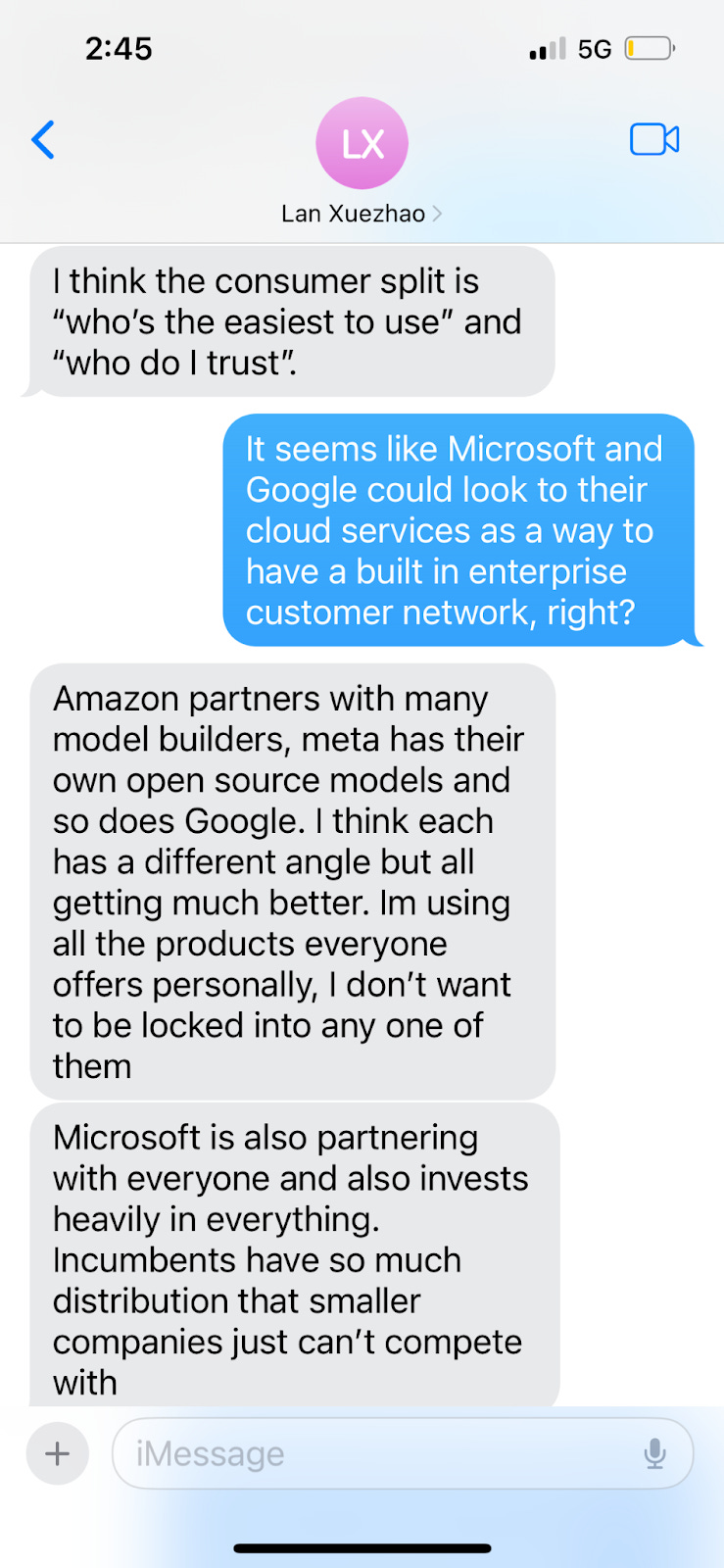AI Model Startups vs Big Tech...SaaS Hit From Two Directions...Menlo Ventures in the VC Directory
Plus, Apple's AI day a hit on Wall Street
The Main Item
Foundation Models Can’t Just Be Smarter Than the Competition
OpenAI launched the generative AI revolution with a straightforward product offering: a website where anyone can use ChatGPT, and pay $20 a month for its smartest language model.
That seems to be working out pretty well so far. The Information reported this week that OpenAI’s revenue run-rate had more than doubled to $3.4 billion annually over the last six months. It’s not clear how much of that might be from enterprise deals, but only $200 million of it came from Microsoft re-selling OpenAI models to corporate customers, suggesting individual users are a big chunk.
Rivals in the small club of companies selling general-purpose foundation models—Anthropic, Mistral AI, Cohere, Google, and Meta—are mostly seen as reaching parity with OpenAI, or close to it, when it comes to technical performance. “LLMs are at risk of commoditization with increasingly nominal performance differences,” Bessemer partner Talia Goldberg wrote on X this week.
But revenue and business strategy are another story.
The Tech Giants
Google’s path is the most straightforward and perhaps most difficult. It needs to defend its near-monopoly on search from any marginal interloper. Maintaining overwhelming market share in the face of new technology is always hard. Google does have deep technical sophistication and plenty of room to grow in cloud, where it’s the third-place player.
Microsoft’s gone deep on its partnership with OpenAI, but there’s plenty of ambiguity on how that will work long-run; OpenAI’s deal with Apple this week has left many wondering what it might mean for Microsoft.
Apple, for its part, is leaning into privacy and its sophisticated proprietary chips to deliver on-device AI, with delivery through its massive distribution channel. Bloomberg’s Mark Gurman reports that OpenAI will only get exposure to iPhone customers, not revenue, in the deal announced this week—an approach that shows the enormous value of Apple’s scale.
Meanwhile, Meta’s strategy has been the biggest mystery: it’s been giving its technology away for free. By one read, Meta is trying to undermine its rivals while building fans in the developer community. Or maybe it’s just building in public, waiting for the right moment to offer a proprietary model. But as long as Meta sticks to the give-it-away-for-free strategy, the foundation model business will be harder for everyone.
Meta, along with the other giants, can afford to play a long game.
The startups, having raised billions, don’t have that luxury.
“I am increasingly concerned that Anthropic, Cohere, Mistral, Reka will need to monetize through M&A because to build an enterprise sales motion at scale is often more difficult than building technology or products,” Gradient Ventures general partner Darian Shirazi told me.
The Startups
Anthropic continues to release research on how its models work, which doubles as a flag that the company is serious about building an “ethical” AI model that people can trust. The basic offering for its Claude chatbot is almost identical to OpenAI’s—but market researchers say it has only a fraction of the customers, with annualized revenue of just $100 million last year.
Anthropic doubled down on enterprise customers recently with the recent launch of its Team plan subscription, which lets businesses access all of their proprietary models with increased context limits and usage windows for $30 a month.
Bringing on Mike Krieger, an Instagram co-founder, suggests Anthropic is in the consumer market long-term, but it’s unclear how central it is for the company compared with enterprise sales.
Cohere for its part may be the pride of Canada’s AI market, but its annualized revenue was just $35 million at the end of Q1. Cohere is doubling down on its push into enterprise-focused applications like retrieval augmented generation, or “RAG,” which allows companies to fine-tune models to their own internal data. It’s an area enterprise customers have valued highly so far, but as Shirazi notes, selling to big companies at scale isn’t easy.
Mistral AI’s positioning as the European champion and purveyor of low-cost open-source models is logical, but doesn’t by itself solve the revenue challenge. The company does have some paid models that are fine-tuned for better performance.
Basis Set’s founding partner Lan Xuezhao told me in a text exchange that she thinks that as the models continue to improve and reach parity at a technical level, what matters the most will be how each one can be integrated into specific workflows. “It’s unlikely that I’ll use anything for email other than Gemini and Copilot for coding just because of the workflows and trust. I think it’s true for most consumers,” she said.
For DoNotPay’s Joshua Browder, model choice definitely matters, and can be a differentiator for him as a startup founder. “We have had situations where potential partners have asked us, ‘Well, what are you using? We will actually prefer you use Anthropic because the models’ outputs are safer.’” Browder told me he primarily uses OpenAI and Anthropic, but knows lots of founders that have prioritized Meta’s LlAMA models for their price point and developer-friendliness.
The image startups show another direction the business is taking: smaller, more cost-effective models that can get more reach. Stability AI launched its latest smaller-parameter model Stable Diffusion 3 Medium this week, which can run on consumer-grade GPUs.
But the larger business questions still loom.
“The consumer subscription business model isn’t great for these models—the open-source ones are catching up and are getting just as good as the closed-source models, so given that, I get the sense things will transition more to an ad-supported model,” said Shirazi. “That means audience size is going to be important and puts the power on the consumer monetization side probably in the hands of Meta, Google, and OpenAI if they can maintain their user base.”
All of these model providers still seem to be fighting for a slice of OpenAI’s market share: Data from Kruze Consulting shows that 67% of the firm’s enterprise customers polled use OpenAI models for their work. OpenAI continues to beef up its business ranks with well-regarded veterans: it just hired Nextdoor’s Sarah Friar and Kevin Weil, who once led product for Twitter and Instagram, as its CFO and chief product officer respectively.
A silver lining for OpenAI’s rivals is that the share of customers using more than one model has inched up from 10% to 15%, according to Kruze. The race for the killer LLM business strategy continues.
VC Directory
Menlo Ventures
Menlo Ventures was founded in 1976 by H. DuBose Montgomery in its eponymous city of Menlo Park, California. Montgomery led the firm for 40 years before retiring in 2016, leading numerous tech and healthcare deals for the firm.
Nowadays, Menlo Ventures focuses on deals across early and growth stages in the AI, bio and healthcare, consumer, cloud, cybersecurity, fintech, SaaS, and supply chain sectors.
The firm holds a large stake in the foundation model startup Anthropic. The Information first reported that Menlo Ventures was leading a new $750 million funding round in December. We’ve heard rumors that the round came in higher.
One of the firm's biggest successes was leading Uber’s Series B round in 2011, which returned 35x after the company's 2018 IPO. Other big exits include Roku, Rover, Poshmark, and Gilead Sciences.
Matt Murphy, Shawn Carolan, and Venky Ganesan are the firm’s managing directors, and Kirsten Mello is the CFO. Murphy focuses on AI, cloud infrastructure, and SaaS deals, while Carolan leads consumer and fintech investing. Ganesan has focused recently on cybersecurity with deals in cloud infrastructure, but has historically led consumer and enterprise software deals too.
Menlo Ventures is now in Newcomer’s VC Directory.
How Much
Assets under management: Over $6 billion
Active Funds
Menlo Ventures XVI (2023): $650 million
Menlo Inflection III (2022): $778 million
Menlo Ventures XV (2020): $500 million






